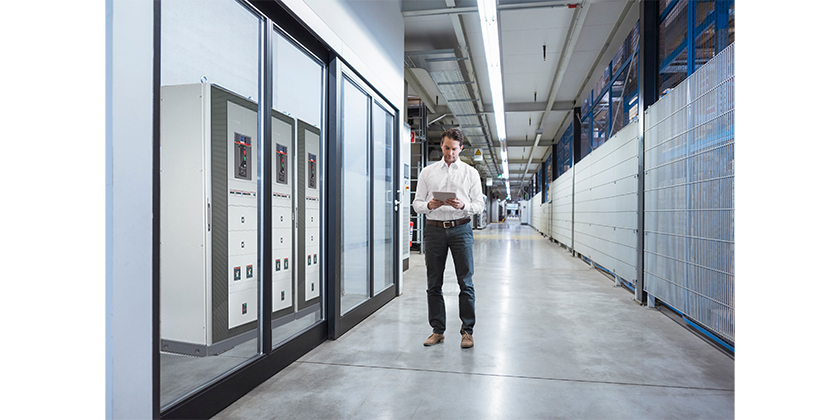The Drive Towards Energy-Efficient Data Centres

January 23, 2025
By Shahrukh Ashhar

Data centres are the backbone of our digital world. They serve as the foundation for various online activities like streaming, e-commerce, website/app usage, Digital transformation. In today’s tech-driven world, our attention is actively captured by our online activities, all of which heavily depend on data centres.
The demand for storage and processing is skyrocketing, further propelling this growth is the rapid adoption of emerging technologies such as artificial intelligence, machine learning and big data analytics. The Internet of Things (IoT), which connects the digital and physical worlds through a network of sensors, and the rollout of 5G networks for mobile devices will fuel the exponential growth of data centres.
Making a Significant Impact on Energy Consumption
The rising demand for data brings a notable problem – data centres use a considerable amount of electricity. They account for 1 to 1.3% of global electricity consumption, with high-density computing devices, cooling, and electrical equipment loads being the main contributors to their overall electricity consumption. As their exponential growth continues to surge, we face a critical challenge: how do we make these data centres more sustainable?
It is crucial to improve energy efficiency to expand sustainably. The industry addresses this by implementing strategies to conserve and recycle the electricity used to operate data centres. Highly efficient devices, transformers, uninterrupted power supplies (UPS) systems, cables, and protection and switching devices, can help with this challenge by ensuring the highest power distribution efficiency.
For example, ABB’s UPS systems provide a continuous and reliable power of up to 24 kV for mission-critical facilities. With 98% efficiency, this power supply protects loads while reducing downtime and constitutes an efficient energy solution for data centres. With such a highly efficient power supply and the right design, the usual 20% power distribution losses can be cut to just 5%.
Enhancing Sustainability in Data Centres
Data centres are driven by cost considerations to enhance energy efficiency, but additional sustainability practices can contribute to further progress and reduced costs.
A growing number of manufacturers are developing energy-efficient solutions by updating legacy equipment with modern digitalized products, reducing an operation’s carbon footprint.
Even straightforward changes, such as replacing conventional switchgear with more environmentally friendly SF6-free digital medium-voltage switchgear, can make a significant impact. Digital switchgear from ABB, combining proven technologies with digital components and software solutions, enhances safety and reduces installation costs. The impacts are significant. These upgrades reduce space needed and optimize operational costs by up to 30% while constantly detecting condition and maintenance needs.
Moreover, digitalized equipment features multiple sensors that measure temperature and humidity and indicate when conditions change. Couple that with electrical device utilization and operating cycle information and digital switchgear can monitor its own health. That way, it can predict potential failures before they occur or alert when maintenance is needed, avoiding costly or unnecessary downtime.
When it comes time to decommission equipment, customers can turn to ABB, which has taken a company-wide approach to circularity. We aim to innovate towards circular business models by cutting waste, increasing recyclability and reusability, and making our products more durable. We also work closely with customers and suppliers to embed circularity across the value chain.
Lastly, from a sustainability perspective, reliability is key to reducing a facility’s carbon footprint. Numerous factors affect data centre reliability, including power conditioning, inadequate cooling, equipment failure, natural and artificial disasters, or human errors. With so many external factors at play, data centres can enhance asset management and monitoring to provide equipment efficiency and optimal resource usage because what’s at stake affects us all.
Overcoming Energy Efficiency Challenges in Data Centres
Given the industry’s cost sensitivity, data centres face numerous challenges in staying efficient and competitive. Managing expenses, especially energy and HVAC costs for equipment cooling, is crucial, and turning to digitalization can help cut costs and enhance overall efficiency.
Cloud based or on-premises connectivity platforms such as ABB Ability™ provide reliable, cost-effective solutions for HVAC energy monitoring and asset monitoring to collect data remotely. That data is then analyzed and accessible on a fully integrated ABB platform. The data, refreshed every 30 seconds, is rolled into a preconfigured dashboard for data centres, and users benefit from all the information about their operation. This includes data points for power usage effectiveness, input and output power, energy trends, peak power, etc. In addition to producing reports and analyses about digitalized equipment, the system provides insights that enable smarter (and even automated) energy consumption decision-making.
What Makes Canada a Hotspot for Data Centre Investment
Investment priorities in the data centre industry are shifting towards regions with available renewable and affordable energy. Hyperscale data centres, facilities owned by and housed by a single large company and colocation providers, which rent to their customers, are now focusing on places rich in clean energy. Hence, the focus quickly turns to Canada, a major clean and renewable energy producer. The country is the world’s second largest producer of hydroelectricity and is gaining investment attention.
Canadian data centres consume about 1% of the total electricity used in Canada yearly. The country’s abundant renewable power sources are not just a competitive advantage for its minimal carbon footprint. They are also attractive for their competitive energy prices and frigid weather conditions. The cold climate allows for naturally free cooling of large infrastructure with a limited investment for part of the year due to cool outdoor temperatures. As a result, Canada places 5th in the world in hosting data centres and estimates that data centre investment will grow to 5.48 billion dollars by 2028.
Currently there are 239 data centres in Canada across eight provinces. Toronto, Montreal, Vancouver are the top three cities.
While Canada’s renewable energy portfolio is attractive, energy demand is expected to grow significantly as we electrify. The growing data centre market is a contributing factor to that increased demand, meaning it will be important to continue growing the country’s renewable energy supply. For example, in Ontario, Canada’s largest data centre market (94 data centres), the IESO recently released a report forecasting 75% growth in electricity demand by 2050. The growing data centre market in the province is cited by the IESO as a primary driver of that increased demand.
“Data centers represent 13% of new electricity demand and 4% of total anticipated Ontario demand in 2035,” the report notes.
Quebec is a key player in Canada’s data centre landscape, attracting both local and international investments. Currently, Quebec is home to over 60 data centres, positioning it as one of the largest data centre hubs in the country. In terms of capacity, approximately 500 MW of data centre power is currently under construction in Quebec. As the demand for data storage and processing power continues to rise, Quebec’s data centre infrastructure is expected to expand further.
Out west, the government of Alberta is looking to attract more data centres. The province recently sent a delegation to Silicon Valley to promote itself as a data centre destination. Alberta is home to 21 data centres, ranking fourth among provinces, behind Ontario, Quebec, and BC. CBC has reported that projects representing 5,000 MW are in development and the province’s grid has capacity for approximately 21,000 MW worth of projects.
Closing Remarks:
In conclusion, data centres are more than just the backbone of our digital world—they are essential to powering the technologies and services that drive modern society. As demand for data storage and processing continues to soar, the industry is evolving with the adoption of emerging technologies such as AI, machine learning, and IoT. With trends like edge computing, sustainability initiatives, and heightened security practices shaping the future, data centres are poised for continued growth and innovation.
For regions like Canada, with its abundance of renewable energy, cold climate advantages, and growing infrastructure, the data centre market presents immense opportunities. As we look ahead, the role of data centres in supporting our digital transformation will only grow, making them a critical component in the future of technology and business.






![Guide to the Canadian Electrical Code, Part 1[i], 26th Edition– A Road Map: Section 56](https://electricalindustry.ca/wp-content/uploads/2022/11/Guide-CE-Code-2-768x432.png)



![Guide to the Canadian Electrical Code, Part 1[i], 26th Edition– A Road Map: Section 56](https://electricalindustry.ca/wp-content/uploads/2022/11/Guide-CE-Code-2.png)



